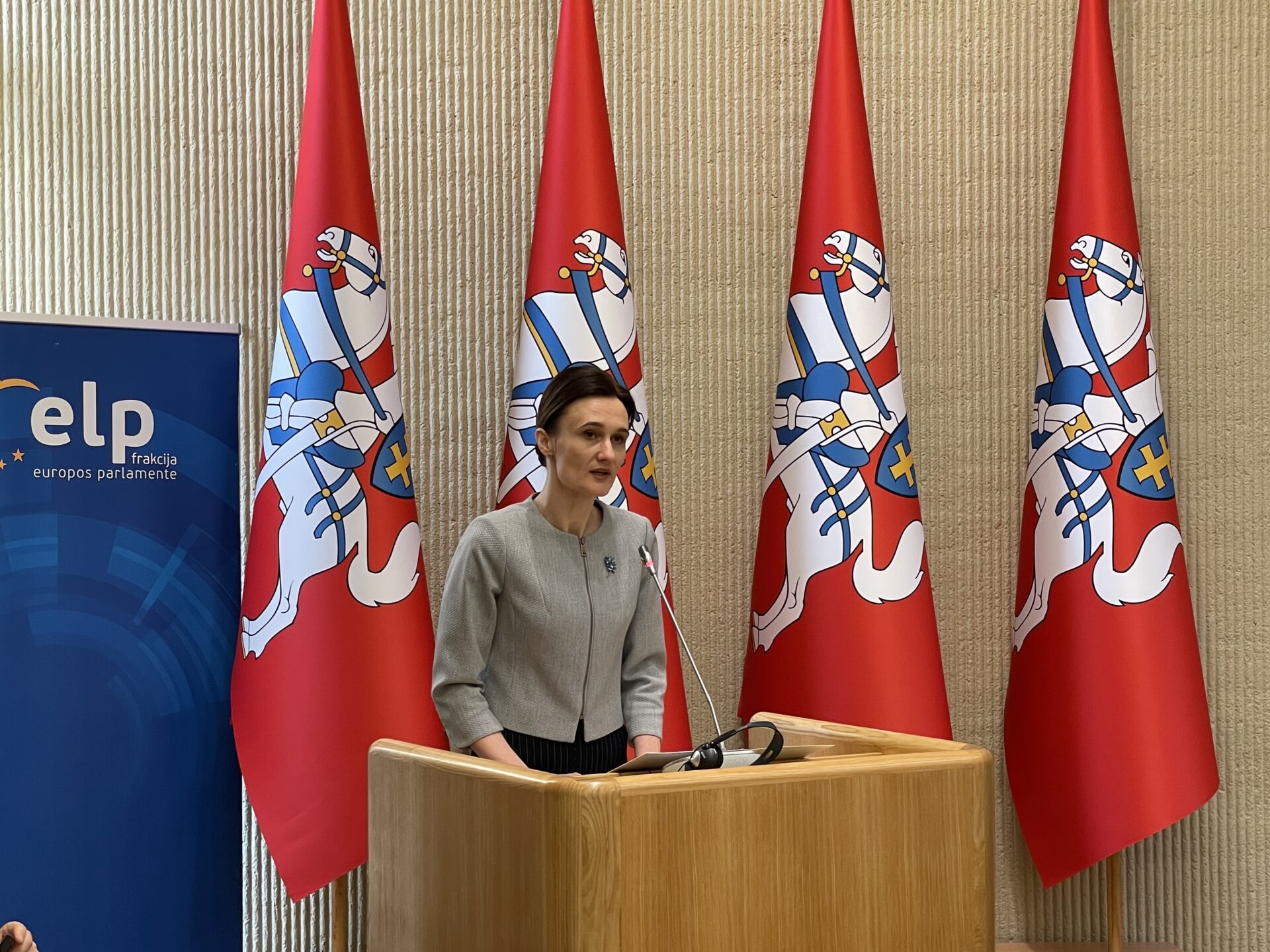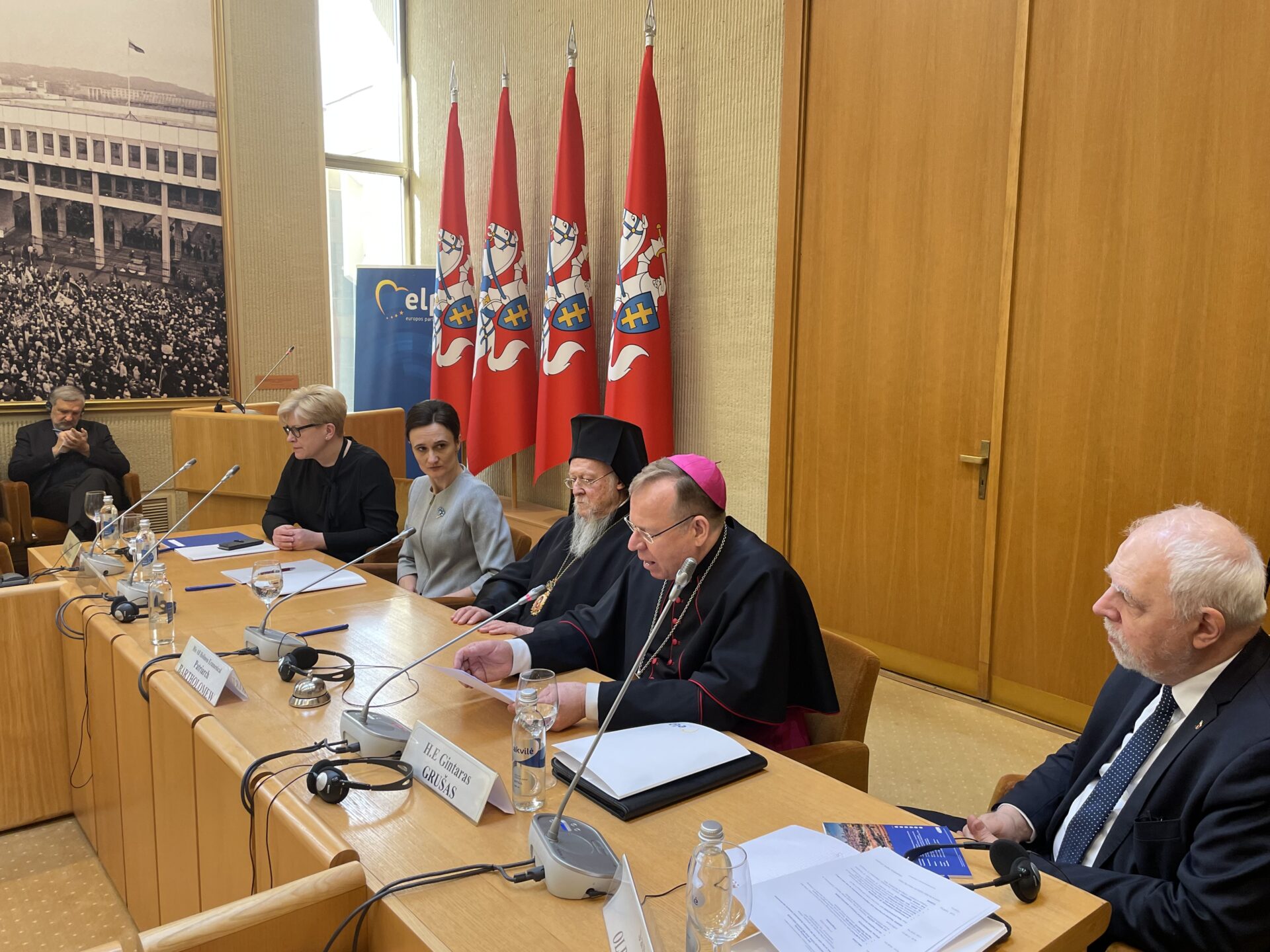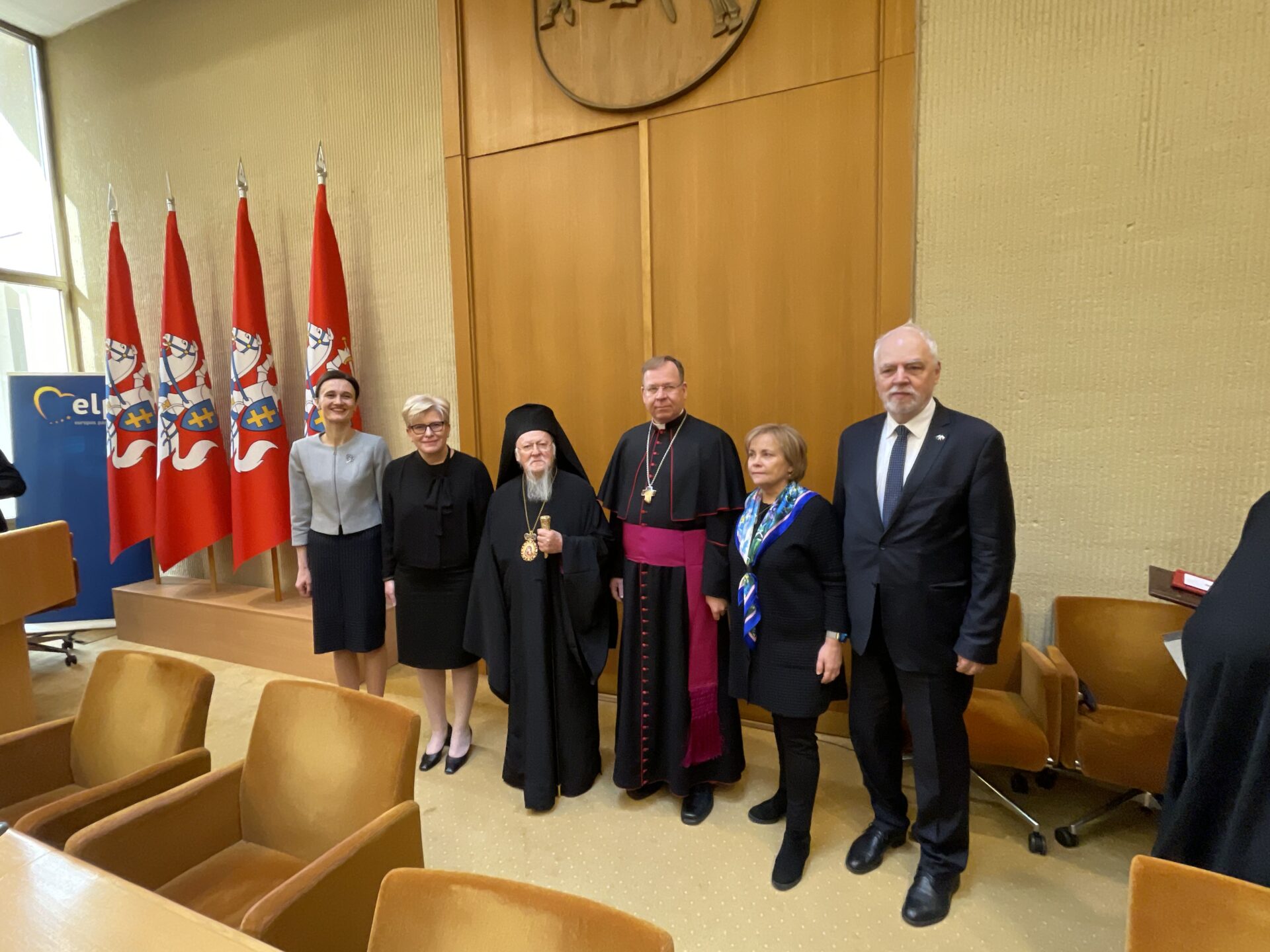On Wednesday, March 22, 2023, the second day of the official visit of the Ecumenical Patriarch Bartholomew in Lithuania, the Ecumenical Patriarch met with the President of the country’s Parliament, Viktorija Čmilytė-Nilsen.
The President first thanked the Ecumenical Patriarch Bartholomew for the restoration of the five priests deposed by the Church under the Moscow Patriarchate in Lithuania and emphasized the hope that his visit to the country inspires.
According to the President of the Parliament, the community of believers has grown significantly since Lithuania received more than 70,000 people from Ukraine who sought refuge there due to the war.
“However, they cannot pray in a Church headed by Patriarch Kyril, who supports the war in Ukraine. In addition, the Orthodox community in Lithuania consists of Belarusians who fled the repressions or even Russians who found refuge in Vilnius to escape the Kremlin’s persecution. Therefore, we must ensure the opportunity for Orthodox believers of all nationalities to practice their faith, without conflicting with their conscience,” said V. Čmilytė-Nielsen. At the same time, she added that she would like to believe that all Christians and people of goodwill, will listen to His All-Holiness’ call to restore peace and justice in Ukraine.
After the meeting, the President of the Parliament opened the international conference on Interreligious Dialogue, where the Ecumenical Patriarch also addressed a greeting. The conference focused on the attitude of Churches and religious communities to war and conflict and was organized by the Group of the European People’s Party of the European Parliament.
Here follows the greeting of the Ecumenical Patriarch in English:
Your Excellency Ms Ingrida Šimonytė, Prime Minister of the Republic of Lithuania,
Your Excellency Ms Viktorija Čmilytė-Nielsen, Speaker of the Seimas of the Republic of Lithuania,
Honorable Vice-Chair of the EPP Group in the European Parliament and Co-Chair of the EPP Working Group on Intercultural Relations and Interreligious Dialogue,
Your Excellency Archbishop Gintaras Grušas, President of the Council of the Bishops’ Conferences of Europe (CCEE),
Esteemed Dr. Jørgen Skov Sørensen, General Secretary of the Conference of European Churches (CEC),
Honorable guests,
Dear friends,
It is with great pleasure that we participate in this special seminar on the “Reaction of Churches and religious communities to war and conflict,” organized by the European Parliament EPP Group on intercultural and interreligious dialogue in the context of our first visit to Lithuania. At this point, please allow us to highlight the crucial role that the Ecumenical Patriarchate played in the formation of this particular Working Group of the EPP back in 1995, during the first year of operation of the Office of the Orthodox Church in the European Union. We take great paternal pride in seeing the seed sown almost thirty years ago to have grown into a fruitful tree with deep and unshakable roots. You are worthy of our sincerest congratulations!
And now we turn to the topic of our address. As you all know, since the end of the Cold War, borders have fallen, barriers have been abolished, the movement of goods, people and capital has been accelerated. All these are aspects of the phenomenon of Globalization, the movement towards a unified world.
However, this unification has been so far strictly material, dominated by economic criteria and technological factors. At the same time, global problems have appeared or become more acute. The climate crisis, the financial crisis, the health crisis of the pandemic, the energy crisis have all been global challenges asking for global action. However, instead of advancing, the necessary for global action political unification of the World stays more or less stagnant; it even regressed recently, because of the Russian aggression in Ukraine. Finally, it became more than clear that beyond the political and economic unification, there is urgent need for a spiritual one. Nevertheless, in this field, as well, instead of progress, unfortunately, we have experienced constant regression.
During the past decades, the illusion that economic globalization would bring about cultural and spiritual convergence, and ultimately lead to global peace, was widely diffused. This idea was expressed in Francis Fukuyama’s famous writings about “The end of History.” We are gradually aware of the contrary, going even beyond Samuel Huntington’s theory of the “clash of civilizations.” Indeed, after more than three decades of globalization, the spiritual distance between the various communities inhabiting our world has increased. This form of divergence leads towards multi-polarity and fragmentation.
Can the economic unification resist to those tendencies? In spite of the elaborate economic and technological networks which bind the world, one can observe the appearance of phenomena of de-globalization and the rise of protectionism. Thus, contrary to the dominant ideas of the previous decades, the spiritual factor conditions the political and the economic sectors. Errors in the spiritual and intellectual spheres are not anodyne. They can lead to disasters, as the Ukrainian tragedy demonstrates. Not only is religion not marginal, but it is a determining factor. This important issue is not entirely understood by the political leaders, in spite of the series of crises in the Western Asia and the Middle East since 1979, in most of which the religious factor was instrumentalized for political and geopolitical agendas; also, in spite of the terrorist attacks, in the name of false religion, in Europe and the United States of America.
Advancing the inter-religious and intercultural dialogue is essential. It can help share perceptions and experiences and contribute to the common search of ideas and solutions, in order to promote peace and understanding. It is therefore with particular interest that we participate to today’s meeting.
There are few places in the world where these ideas have more resonance than here, in Vilnius, a few hundred kilometers from the front line where war is raging. As the world is in a process of fragmentation, the areas between two emerging blocks are submitted to strong pressures. The isthmus between the Black Sea and the Baltic Sea is one of them, Ukraine being its central component and Lithuania a part of it. Although Lithuania is protected since 2014 by membership to NATO, the existing anxiety and fear are not unfounded. Lithuania’s tragic history has provided its citizens with a profound and rare geopolitical sensibility and wisdom.
The present Ukrainian crisis, due to the unprovoked Russian aggression, is the epicenter of a geopolitical earthquake. Europe wakes up from a deep illusion, according to which war in its continent was a thing of the past. Materially and intellectually unprepared, Europe, however, adapted rapidly to this unexpected situation, intellectually assisted by its new members, like Lithuania. The outcome of this war will undoubtedly condition the future evolution of both Europe and the world.
The Ukrainian crisis relates at the same time with the most fundamental challenge in the Orthodox Christian world. Will Orthodoxy continue to be spiritually guided by its source and defender, its traditional and historical center, the Ecumenical Patriarchate of Constantinople? This is an essential question for the character, identity and existence of Orthodoxy. It is also an issue with serious consequences for the whole of Europe, as well as for Africa, the Middle East and the diaspora Orthodox communities all over the world.
The religious space organized around a Kyiv-Moscow axis is the initial creation of the Ecumenical Patriarchate of Constantinople and of the Byzantine Empire. This process started more than a thousand years ago with the baptism of Vladimir, ruler of the Kyivan Rus, an enormous area linking the Baltic with the Black Sea. During the long period since then, the political map of this region has known successive changes, through which painfully emerged Ukraine and the Ukrainian identity. All along those historical tides, Eastern and Western Christianity crossed, leaving behind a mixed religious environment.
Russia also emerged from this initial creation. In 1589, its Church obtained from the Ecumenical Patriarchate its elevation to the Patriarchal dignity. However, already after the fall of Constantinople to the Ottomans in 1453, the unfounded ideology that Moscow could succeed Constantinople as spiritual leader of the Orthodox world started to make its way. According to its proponents, Moscow would become the “Third Rome,” after the “fallen Second,” Constantinople. We have said it many times in the past and we take the opportunity to repeat it once again: there has never been a “First” and a “Second Rome;” therefore, it can never exist a “Third Rome.” There is only the Elder Rome and the New Rome-Constantinople.
The religious tradition transmitted by Constantinople to Moscow was soon confronted with the Russian political power. Successive Tsars imposed their will on the Church, transforming it into a mere instrument for their strategic objectives. Of course, the Church of Russia did not always or wholly comply. Monasteries have served as refuges for the authentic religious faith. However, numerous are the instances of religion’s instrumentalization in this vast region. Putin’s Russia simply renewed and accentuated this “tradition.”
Of special importance in this respect is Panslavism, the ideology according to which all Slavs should be united under Moscow’s leadership. This 19th-century deeply racist ideology found its religious expression in ethnophyletism, condemned as a heresy by the Great Council of Constantinople in 1872. According to this ethnophyletism, autocephalous (namely self-governed) churches should not be founded on the basis of locality, but of ethnicity. This heresy was used to legitimize the institution of a Bulgarian Exarchate inside the Ottoman Empire, as a first step for the creation of a Bulgarian state. It contributed to the division of the Christians in the Balkans and initiated fratricide conflicts and wars. The present incarnation of ethnophyletism is the fundamentalist ideology of Russkii mir, the “Russian World.” This expression describes a supposed sphere of civilization including Russia, Ukraine, Belarus as well as ethnic Russians all around the world, politically and religiously led and directed by the Moscow center. The “Russian World” is presented as the answer to the “corrupt West.” This ideology is the main instrument for a “spiritual” legitimation of the invasion in Ukraine.
It is a fact that Moscow’s antagonism towards Constantinople subsided during the communist period, as religion was persecuted by the soviet regime. On its part, the Ecumenical Patriarchate protected the Russian emigrés and hosted their religious communities inside its diaspora Metropolises. However, from time to time and especially since the election of Kirill as Patriarch of Moscow in 2009, the antagonism was resumed. In the minds of the Russian political and religious leadership, religion became too important as a political and geostrategic tool to be left in the hands of the Ecumenical Patriarchate. In its effort to obtain a leading role, Moscow used a quantitative argument. Claiming then that the Church of Russia has under its influence the majority of Eastern Orthodox believers, it tried to obtain the primacy within the Orthodox Church. This argument was strongly employed when the Holy and Great Council of the Orthodox Church was convened in Crete in June 2016. The rejection of this argument was the main reason for Moscow’s refusal to participate in this historic conciliar event for Orthodoxy. Recently, the divisive role of Moscow took also the form of uncanonical infiltration in Africa, challenging thus the exclusive jurisdiction of the Orthodox Patriarchate of Alexandria in this continent.
Meanwhile, numerous times the Ecumenical Patriarchate had received clear expressions of the wish of both the clergy and the political leadership in Ukraine for ecclesiastical independence from Moscow. On the 5th of January of 2019, the Tomos granting autocephaly to the Orthodox Church of Ukraine was signed at the Phanar. The departure of the significant Ukrainian Orthodox population from the tutelage of Moscow deprived the Church of Russia of much of the substance of its anti-ecclesiological claim about its attempted leading role in Orthodoxy.
With the end of the Soviet Union and the bankruptcy of the communist ideology, pseudo-religion emerged. The old imperial strategies were then combined with the cynical techniques and mechanisms developed and inherited from the Soviet Union. The Church and the State leadership in Russia cooperated in the crime of aggression, and share the responsibility for the resulting crimes, like the shocking abduction of Ukrainian children. They have provoked enormous suffering not only to the Ukrainian people, but also to the Russians, who count more than a hundred thousand casualties and the responsibility for terrible attrocities.
There is a serious ongoing discussion about the reconstruction of Ukraine, after the end of the War. However, next to the issue of the material reconstruction there is also the question of the “spiritual regeneration” not only in Ukraine, but equally in Russia. What is needed is a return to the springs of Orthodox faith. The Mother Church of Constantinople is ready to assist its children in Ukraine and Russia once again, as it has done it on multiple occasions in the past. The love of a mother is endless; it does not know limits. This is precisely the kind of love that the Ecumenical Patriarchate represents and expresses.
Similarly, our inter-religious dialogue has to focus not only on ways to resist to and neutralize the capacity of the leadership of the Moscow Patriarchate to undermine unity and to theologically legitimize criminal behavior. It is our common Christian duty to use our forces of dialogue to bring back our Russian brothers and sisters to our community of shared values.
Esteemed audience,
The Ukrainian crisis has to be overcome with determination, justice and solidarity. Its outcome will play an important role in other challenges during these hard times. We are particularly grateful to the organizers for giving us the opportunity to present the position of the Ecumenical Patriarchate on this complex and delicate issue of global importance. We wish you all fruitful deliberations and productive outcomes from the discussion during this seminar. May the God of love and peace bless you all in your ministries and personal lives! Thank you for your kind attention.
Photos: Nikos Papachristou / Ecumenical Patriarchate




















